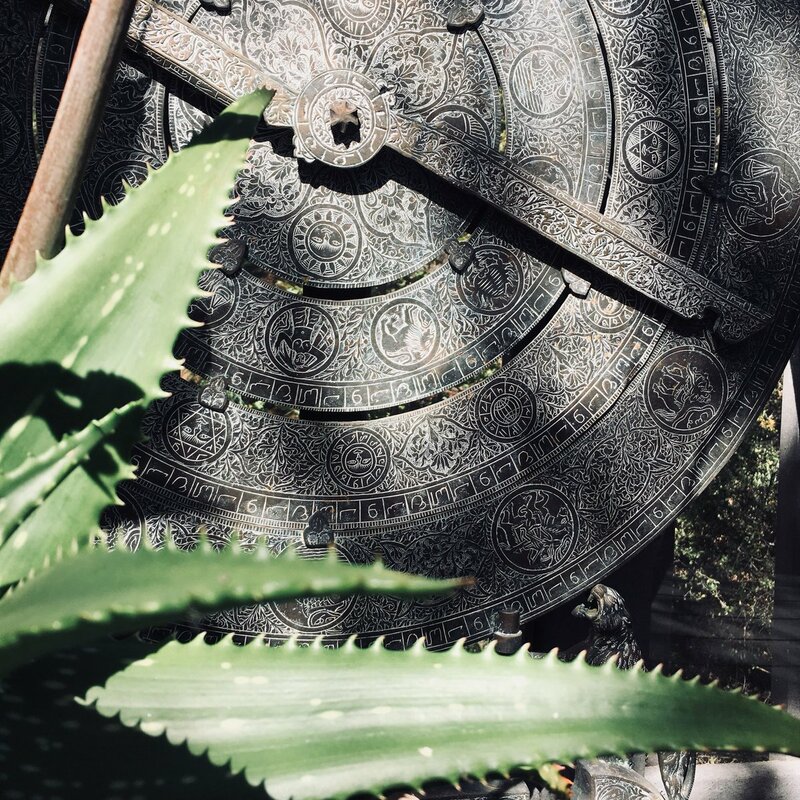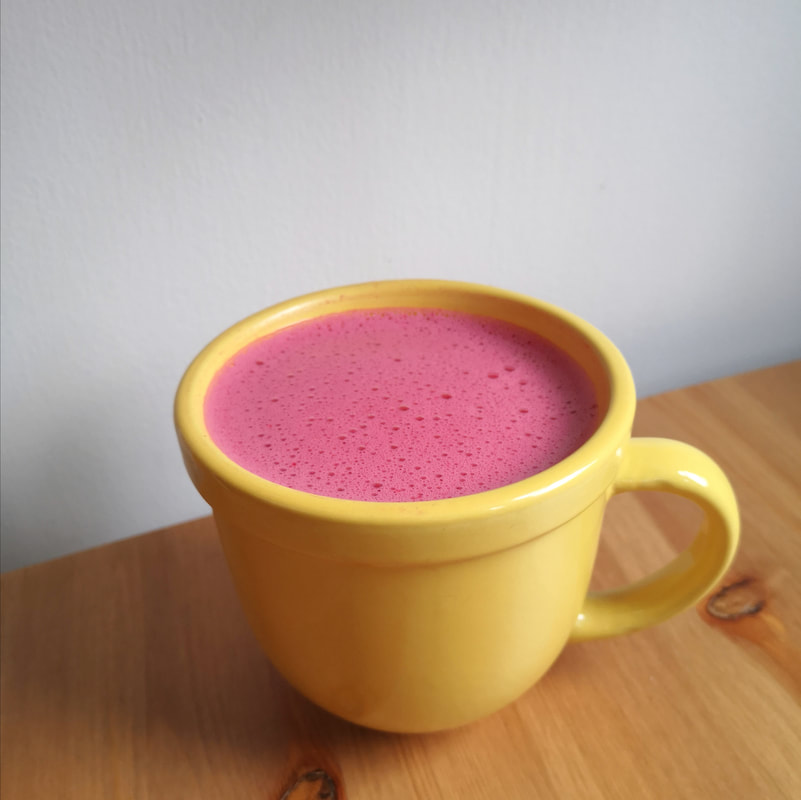|
it's squash season. i've never been a squash person (except as a baby?), but this year is different. my neighbour and i decided to start splitting a "basket" of fruit and vegetables: every week, we pick up a boxful (minus the box!) of produce that's either been rejected or considered surplus in some way. this usually includes whatever's in season. so, lately, we've been getting different varieties of winter squash. in my fridge, there's a large jar of pumpkin butter — the result of what has turned out to be, by far, my most successful winter squash experiment. in the non-squash category, i got fresh beets that i had no idea what to do with until i saw this video. i made beetroot milk! i used raw beets (plural because they were really small) and, though i would definitely have needed a strainer, the result was delicious, not to mention colourfully cute. my kitchen experiments serve three purposes: they feed me, they ground me, and they give me space to play. i honestly had more fun destroying my jack o'lantern by cooking it and turning it into butter than i had when i carved my pumpkin. i'll admit my experiments don't always make for the most delectable meals (like when i thought it was a good idea to put grapefruit in my hot oats, or to eat my spaghetti squash with only nutritional yeast and a pinch of salt), but i am discovering the fun of doing something "just to see what happens." joy hides in strange places. i want to be someone who sees it and enjoys it when it flies by. for example, i have this tin of pumpkin chai tea that smells so good that it makes me smile, automatically and uncontrollably, whenever i catch a whiff of it. it doesn't matter if i'm having a good day or not. these little things anchor me. without them, i would feel like i am floating aimlessly, because these days, i don't have anything near the clear overview of Life i crave and seek. my compass is broken, and it took me a bit too long to realize it and take down my sails. i lowered my anchor and now, i'm trying to fix my compass. "trying to fix my compass" means that i'm delaying important decision-making until the end of the month; in other words, i'm trying to use the month of november to "gather data" i will later analyze. kind of like in the scientific method. actually, who am i kidding? exactly like in the scientific method. you can take the nerd out of science, but you cannot take science out of the nerd. and so, in parallel with my kitchen experiments, i conduct other experiments i take more seriously. i probably take them too seriously. the overarching goal of these more structured experiments is to find the constants: the components of the compass that never change. hopefully, with these constants, i'll be closer to having a compass that works. i'll be honest: when i say "constants," i am for the most part referring to personality types. i am trying to have a more solid understanding of my enneagram and myers-briggs* personality types, because according to these theories, a person's personality type doesn't change; rather, it is a flexible model that manifests differently in different people, contexts and life stages. i love the enneagram and myers-briggs systems. i know some people dislike personality typing in general, because they consider it rigid or limiting, but after studying different systems for some years, i have learned that a personality type, when the system is properly conceived, is designed to be fluid, adaptive and growth-orienting. in other words, to borrow ian morgan cron's image (which he applies to the enneagram), the point of knowing our personality type isn't to put ourselves in a box with a label on it; it's to find a way out of the box we've inadvertently stuck ourselves in. personality types aren't labels, they're maps. these maps — provided we've got the ones that truly fit us best — point us to our highest potential. please note that what i'm referring to is the mbti system with its jungian basis (see it presented as the car model or on one of my favourites mbti blogs) and the enneagram in its many forms, including what i would call the classic enneagram, the instinctual subtypes (as best explained by beatrice chestnut, in my opinion) and, to a lesser extent, the tritypes (as developed by katherine fauvre). i have been wrong about my personality types more often than i've been right. in fact, i don't even know if i'm currently right, and besides, the whole concept of "being right" hinges on the assumption that personality typing theory works. (to better understand what the concept of "theory" means, i recommend this ted-ed video or its blog post version. not that personality typing is particularly scientific, but i think it helps to remember that it's not a law.) obviously, that's the assumption i'm running with: the enneagram and mbti personality typing theories work, and if i find my correct type in each system and interpret it correctly, i will have valuable advice to guide my self-growth. so, this is what i'm doing this november: experimenting. am i this myers-briggs type? am i this enneagram type? how will i enjoy doing nanowrimo? what in the world can i do with an acorn squash? why am i feeling aimless? how does this or that hypothesis fare in the real world? and i will try my best to remember — and i apologize for the wildly random metaphor — that taking time to focus on improving the plough is the opposite of neglecting the field. what about you? what's your november like? do you have any good acorn squash recipes to share? *mbti and myers-briggs are reserved and in no way am i a certified practicioner. therefore, everything i write about the mbti should be taken as nothing more than an opinion.
1 Comment
summer is over, and i think it's time i break my silence here and post something. i was caught in an inner whirlwind of healing. at the time, i couldn't fully make sense of what was happening. i couldn't see the overarching theme in my growth. all i knew was that come the end of the summer, my nesting instincts (which i hadn't known i even had) were kicking in at full force. suddenly, i knew exactly what kind of "nest" i wanted for myself. i've been working on myself with much dedication for a long time. i trace it back to three years ago, almost day for day. i was 24. i'd spent the three years before that as a shell. i have almost no memories of the years i was 21, 22 and 23. the other day, i saw a picture of myself from that period and i literally did not recognize myself. i squinted and said: "who... what... is that me? i had that hair?" yesterday, for no discernable reason, a memory from that time popped in my head: i remembered the lemon cookies i used to make when i was 22. i remembered the sweet lemony taste and the perfectly soft and chewy texture. honestly, i think that was my first time remembering something from those three years that i didn't want to burn out of my brain. i remember loving those cookies so much because they felt like the one thing i could do right. i felt powerless — most days, all i ate was peanut butter on toast and all i did was lie on the couch and watch the sky darken — but some days i could manage those cookies. for a few minutes the cookies made my roommates happy and that was the best i could ask for. all that and much more was over by the time i turned 24. the question "why?" was plaguing me, as it had over the three years prior. why? why had all that happened to me? i set forth on my journey to try to find an answer, because without an answer, how could i know for sure that it wouldn't happen again? anyway, fast forward. 24 to 27, three years of zealous introspection. i studied anything that might help explain my experience of shellness: several personality typing systems; possible alternate/additional diagnoses; queer identities; different topics in fields such as psychology, personal development and spirituality... results were few, far in between, and often short-lived. i think i considered 9 different myers-briggs types and 6 different enneagram types, among other things. it was a confusing time. in 2019, and especially the past summer, i started seeing results at a much higher pace. using the enneagram for a bit because it's easierturns out....... i'm a 4.* that's enneagram talk. i don't want to start explaining the enneagram or even guiding you towards resources because whenever i start i have a hard time stopping. but i'll try to condense it infinitely: the enneagram splits people in 9 types (numbered arbitrarily 1 to 9) according to the main threat they perceived in their environment as children and how they managed to cope with that threat. "4" is a type. the most important thing i absolutely want to stress to anyone reading about the enneagram is this: you may get the impression that the enneagram is a self-flagellation session that makes you realize what a terrible person you are. please allow me to shift your perspective on this: all enneagram types embody equally good ways for the young psyche to protect itself from perceived threats in the environment. we all have an enneagram type. that's good because it means we were brave enough to find ways to protect ourselves and make it to adulthood. however, these protections inevitably backfire in adulthood. all of them. there's no type that backfires more or less than the others. learning about your enneagram type is helpful because it helps you say: thank you, subconscious, for protecting me the best you could; now, it's my turn, and i will protect myself in healthier ways that will allow me to grow and become a better person. that's so important to understand. we all hate our enneagram types at first (if you don't, you're probably mistyped), but it's important to grow past that and find space for gratefulness and acceptance. now, type 4. 4s, when they were hurt in childhood, used the explanation "i was hurt because i am bad and unlovable" rather than see the world around them as mean-spirited. this way, 4s developed a vision of themselves as impossible to love and lacking in everything. nothing can ever redeem them. because they believe themselves to be unlovable, 4s both fear being abandoned and somehow unconsciously want to be abandoned (because it will confirm their worldview). 4s put a lot of emphasis on emotions: their own and others'. they daydream of happiness, and they envy others, especially those with "simple" lives, but they are so convinced that they are too broken or complicated to be happy that they sabotage their wellbeing in different ways. something that clued me in on the possibility that i might be a 4 was when i got the feedback from someone who knows me well that i was (wrongly) convinced i wasn't important to other people and that i was never satisfied. the way 4s experience these patterns in everyday life changes vastly from one instinctual subtype to the next. i've heard them described as the glad 4 (self-preservation subtype, sp4), the sad 4 (social subtype, so4) and the mad 4 (sexual subtype, sx4). for example, imagine three toddlers who want to get their needs met by their parent. the first one behaves as well as possible and hopes this will attract the attention, love and approval of their parent (sp4). the second one starts crying and talking about how much they are hurting and lacking (so4). the third one throws a tantrum about how everything is unfair and it's all their parent's fault (sx4). even as adults, 4s have a hard time directly asking for help and, especially, for love. instead, they are consumed by envy, and they end up acting out that envy by masochistically enduring (sp4), vocally complaining (so4) or angrily demanding (sx4). of course, in real life, most people aren't just one subtype. they have a dominant subtype, and a second one, and one they use the least. my conclusion is that i am a sp4, though i do tend to reach for anger like sx4s from time to time.* (note: my main/favourite source of enneagram information is The Complete Enneagram by Beatrice Chestnut.) end of enneagram talkironically (or not so ironically), what helped me find my enneagram type in the end was to focus on healing for a while without thinking about the enneagram too closely. i did my introspection challenge as well as the 12-week challenge presented by Julia Cameron in her book The Artist's Way. that's what i've been doing all summer. after a while of this introspective healing, i reflected on what was helping me the most. by analyzing these helpful techniques/paradigms, i kind of reverse-engineered what i had started out most needing. the most helpful change i have instated in my journey is self-nurturing, hands down. unsurprisingly, it turns out that not asking for support is the best way to not get support! it also turns out that beating yourself up all the time about everything is helpful in absolutely zero ways. halfway through The Artist's Way, Julia Cameron presents the affirmation: "treating myself like a precious object will make me strong." self-nurturing means i am taking over the role of being my own parent. for a long time, the idea of having to "parent" myself made me feel sad and lonely. now, it feels comforting because i trust myself more. it's honestly so comforting to know you have someone there who will always give you what you need. like, i need to take a day off? i take a day off. i need warm tea with oat milk and honey? guess what, i have warm tea with oat milk and honey. i need to feel like my emotions are valid? surprise, i validate my emotions. my cluttered kitchen counter makes me feel overwhelmed? i do the dishes and, not thirty minutes later, i can breathe easier. i'm so thankful for the care and support my parents have provided me with, and for what they still provide me with. but no matter how hard they tried, they weren't perfect. i understand why i didn't receive some fundamental forms of care, and i forgive my parents — and myself — for that. now, it's my job to "parent" myself. i can give myself whatever forms of care i need. the best part? i don't even have to ask. that being said, learning to ask for support is still important. it's something i'm in the process of doing. i am trying to cultivate friendships where we both welcome the other when they ask for support. i used to recoil from self-nurturing for different reasons, the most important of which being: i thought self-nurturing was selfish. here's what trying out self-nurturing taught me: true self-nurturing is the least selfish thing one can possibly do. the more i nurture myself, the more caring and loving i am towards other people and the world. i get less angry. i listen more. i am more present. i adopt more eco-friendly habits. i love without worrying that i will not get love back. asking for support has a similar consequence: the more i ask for support, the more comfortable others seem to be asking me for support. there is simply more love to go around. maybe it's no coincidence that the memory of the lemon cookies popped in my head yesterday. because that's love, too. i made them because i loved them. because my roommates loved them and because i loved my roommates. because for a while something was stronger than hopelessness. love, my friends. it's abundant and you deserve it. *edit (2019/11/11): i am no longer under the impression that i'm a 4. regardless of whether or not i am a 4, everything else i wrote here still stands. i especially want to repeat how important i think self-nurturing is! whatever my enneagram type is, self-nurturing changed my life.
|
the cluba small collective dedicated to personal, creative, and communal growths. Archives
January 2021
Categories
All
|





